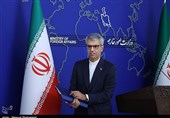Iraq’s New Parliament to Meet for First Time
TEHRAN (Tasnim) – The newly elected Iraqi parliament is set to assemble for the first time nearly three months after the October polls, following an uncertain election season.
Traditionally, the first parliamentary session would be tasked with electing a speaker of the parliament and his two deputies. Yet, according to the agenda released by the Council of Representatives, Sunday’s session would only include “nominations of the Speaker and two Deputies”, suggesting a potential non-confirmation on who the speaker would be.
The electoral commission informed representative Mahmoud al-Mashhadani that he is the most elderly member of the parliament and will chair the first session, in accordance with the constitution, according to Al Jazeera.
This process, according to analysts, will be anything but smooth: no political party has snatched enough support to be able to single-handedly sway where Iraqi politics in the next four years are heading.
The early elections – which saw the lowest voter turnout rate since the political system was established following the United States-led invasion in 2003, with just 44 percent – pushed Muqtada al-Sadr to a sweeping win with 73 out of the 329 seats.
In the months after the first parliamentary session, Iraq’s political landscape was dominated by meeting after meeting between different parties trying to form a government that would advance their respective interests, interspersed with constant background claims of fraud and threats to boycott the entire election results.
The dust generally settled after the Iraqi Federal Supreme Court ratified the final results of the election in late December last year, with only a few changes from the preliminary results, even though the remaining tensions over the election results could for months still affect the coming government formation.
Al-Sadr, who won the biggest share in part because of his carefully calibrated campaign strategy to use the new electoral law to his advantage, has been vehemently pushing for a majority government that would essentially place the Fateh alliance and former prime minister Nouri al-Maliki to the opposition side.
“I see that the first thing that needs to be done for the future for the country is a national majority government,” al-Sadr said in a statement soon after the election results were certified.
The uncertainty that revolves around the nomination of the speaker of parliament extends to two other presidencies: the president, reserved for Kurds, and the prime minister. Similarly, their respective political groups have not yet reached any agreement, either.
No name has come close to being widely believed to be able to claim the premiership, and the tension continues to grow as al-Sadr pushes for a Sadrist candidate.






